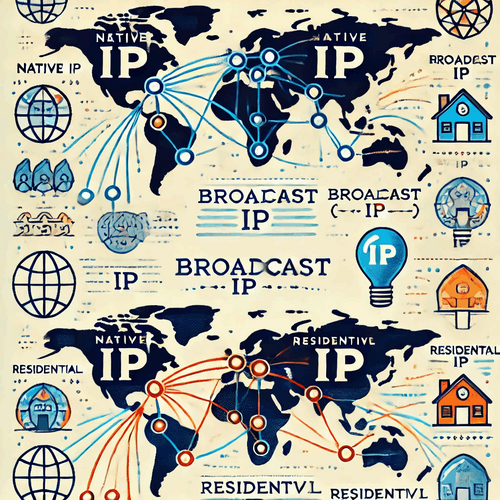Guide to Kubernetes Troubleshooting: Commands
Table of Contents Identifying Issues Common Pod ...






In the realm of networking, IP addresses can be categorized into several types, with Native IP, Broadcast IP, and Residential IP being the most common. Understanding these distinctions is crucial for enterprise network deployment, data center operations, and even everyday use by individuals. Below is a detailed explanation of each IP type and its suitable use cases.

1. What is Native IP?
Native IP, also known as local IP, refers to an IP address where the registration location matches the country or region of the data center where the IP is currently located. These IP addresses are typically highly stable and possess specific geographical attributes, making them ideal for commercial use, enterprise networks, and data centers that require services tied to a specific location. Due to their local affiliation, Native IPs are particularly important in scenarios where accurate geographic positioning is necessary. This unique value often makes Native IPs more expensive.
2. What is Broadcast IP?
Broadcast IP, also referred to as non-native IP, is an IP address where the registration location does not match the country or region of the data center where the IP is being used. These IPs are assigned to different countries or regions through specialized methods, allowing them to be utilized globally. Broadcast IPs are more cost-effective and, in most cases, users will not notice a difference compared to local IPs. This makes them popular for scenarios that do not require strict local affiliation, such as international access and general data transmission.
3. What is Residential IP?
Residential IPs are typically a type of Native IP, characterized by being assigned to home users by local Internet Service Providers (ISPs). Unlike Native IPs used in data centers, Residential IPs are closer to the everyday internet usage needs of individual users. They are often used in situations where IP restrictions need to be bypassed, such as accessing region-locked games, streaming services, e-commerce platforms, and online learning. Residential IPs offer a more personalized user experience and are distinct from data center IPs, making them ideal for applications that require a home-user environment.
Conclusion:
Choosing the right type of IP is essential depending on the business requirements. If your operation demands precise geographic accuracy, Native IP is the best choice. For cost-effective solutions where local attributes are less critical, Broadcast IP is suitable. Finally, for scenarios requiring a residential user experience and the ability to bypass regional restrictions, Residential IP is the ideal option. Understanding these differences will help optimize and allocate network resources more effectively.
Table of Contents Identifying Issues Common Pod ...
Speed is crucial for any website, and WordPress is no e...
Run a private, 24/7 AI assistant on a SurferCloud VPS �...